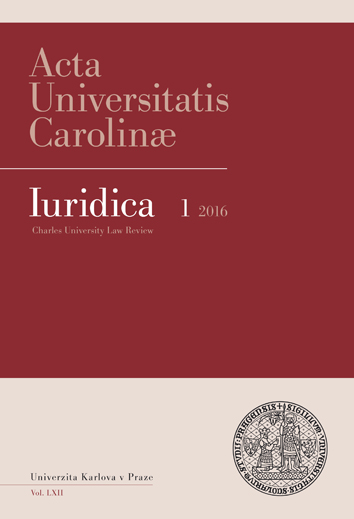Právní řešení odchodu a návratu krajanů do Československa z pohledu pasové politiky v historické retrospektivě
Legal Resolution of the Departing and Returning of Compatriots to Czechoslovakia from the Point of View of Passport Policy in the Historical Retrospect
Author(s): Petra SkřejpkováSubject(s): Law, Constitution, Jurisprudence
Published by: Univerzita Karlova v Praze, Nakladatelství Karolinum
Keywords: emigration; passport policy; travel documents; unauthorised departing from the Republic; the right of return
Summary/Abstract: The article focuses on the mapping of migration, and particularly of emigration, of our compatriots in the previous century. The issue is regarded from one aspect, namely reversed emigration, i.e. re-emigration and especially the right to it, i.e. the right of return. To simplify the presentation, it is divided into five parts: the period of the first republic, the time of the occupation of the Sudetenland by the German empire and the establishment of the Protectorate Bohemia and Moravia, the period of the return into the homeland after World War II, the period between 1944–1948, the period between 1948–1989, and the migration in the latest decades, i.e. after 1989. In connection therewith the issue of emigration, i.e. the state-approved departing from the Republic, is dealt with as well. Attention is further given to the issue of state citizenship that gradually became a prerequisite for the granting of a passport so that the homeland could be left and subsequently returned to lawfully. After 1948 the unauthorised crossing of the borders was criminalised and a new crime occurred, “Unauthorised departing from the territory of the Republic and disobedience of an order to return” (p. 40). The legal regulation gradually underwent certain change and the punishment was sometimes mitigated by a general pardon by the president of the Republic. Finally, the author considers the way in which the punishment was put into practice, i.e. how many persons emigrated, etc. This issue is naturally connected with the complicated issue of the permeability of the state borders, which gradually became completely closed and impassable for refugees in either direction. The change of the legal regulation came about after the 1989 revolution and the fall of the Iron Curtain.
Journal: Acta Universitatis Carolinae Iuridica
- Issue Year: 62/2016
- Issue No: 1
- Page Range: 171-187
- Page Count: 17
- Language: Czech

